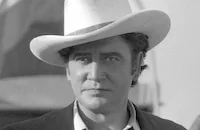American Empire
Cast & Crew
William Mcgann
Richard Dix
Leo Carrillo
Preston Foster
Frances Gifford
Robert H. Barrat
Film Details
Technical Specs

Synopsis
At the close of the Civil War, business partners Dan Taylor and Paxton Bryce work as riverboat captains, but Paxton yearns to earn more money. When the ferry accidentally runs aground, Creole cattle rustler Dominique Beauchard herds his cattle into the river and makes a deal with Dan and Paxton to transport his cattle on the ferry. Dan and Paxton throw Beauchard overboard and keep his cattle when they learn that he has no intention of paying the fare. Paxton convinces Dan to sell the ferry and cattle, buy land with the proceeds and take up Beauchard's business of rounding up loose cattle, which have strayed from their home ranges during the confusion of the war. Eventually, Paxton falls in love with and marries Dan's sister Abigail, and after a year of hard work, the three have accumulated vast ranch lands. They are still plagued by Beauchard, however, who rustles their herds because he resents the fact that they have taken his business. Shortly after a successful cattle drive, Dan has a run-in with Beauchard and believes that he has killed him. Beauchard's men rescue him, however, and he lays low while he plans his revenge. Seven years pass and Paxton and Abby's son Junior grows up carefree under the influence of Paxton's former riverboat mates, Sailaway and Runty, who now work as ranch hands. Paxton, having successfully built his own empire in Texas, has become obsessed with money and blames neighboring ranchers for the slow disappearance of 3,000 head of cattle. He insists on posting "no trespassing" signs to prevent the ranchers from herding their cattle across his land, and refuses to sell any property to a proposed railroad which would improve local business. When neighboring rancher Crowder forces his herd onto Paxton property, Paxton, Jr. tries to defend his father's land and is killed in a stampede. Paxton refuses to accept responsibility for creating the situation which killed his son, so a disgusted Dan dissolves their partnership. Even Abby has grown disillusioned with her husband and plans to leave with Dan. Paxton has Beauchard arrested when he learns that he is responsible for his disappearing cattle. Although Beauchard is found guilty of theft, among other offenses, he escapes from jail, and he and his gang then ransack the town. The ranchers, meanwhile, gather forces to lynch Paxton because the barbed wire, which he bought to protect his land, will mutilate their cattle. Dan returns to the ranch to help Paxton, and when Abby comes to warn them of Beauchard's treachery, she appeals to Paxton to help his neighbors defend themselves against Beauchard. Dan, Paxton and the ranch hands set a firetrap with barbed wire at Bottleneck Pass, through which Beauchard and his men are headed, while Runty tries to forestall the angry ranchers. Beauchard's gang is trapped in the pass and a gunfight ensues amid the flames. The ranchers hear the gunfire and arrive to help Paxton and Dan. Beauchard eventually breaks through the barricades and shoots Paxton, who then kills the rustler. Peace is restored when Paxton recovers from his gunshot wound and compromises with Crowder by allowing the railroad on his land, in exchange for building fences with plenty of gates that allow free passage.

Director
William Mcgann
Cast

Richard Dix

Leo Carrillo

Preston Foster

Frances Gifford

Robert H. Barrat

Jack La Rue

Guinn Williams

Cliff Edwards
Merrill Guy Rodin
Chris Pin Martin
Richard Webb

William Farnum
Etta Mcdaniel
Hal Taliaferro
Jean Ann Rose Guthrie
Earl Spainard
James Ferrara
Jack Trent
Crew
Gladys Atwater
Gladys Atwater
Ralph Berger
J. Robert Bren
J. Robert Bren
Gerard Carbonara
Glenn Cook
Dick Dickson
B. Reeves Eason
Russell Harlan
Ben Grauman Kohn
Emile Kuri
Carrol Lewis
Earl Moser
Lew Pollack
John Powers
Lewis J. Rachmil
Sherman A. Rose
Harry Sherman
Earl Spainard
Archie Stout
Irvin Talbot
William Wilmarth

Film Details
Technical Specs

Quotes
Trivia
Originally made by Paramount but sold to United Artists for release.
Notes
According to a Hollywood Reporter news item, David Buttolph collaborated on the music score with Gerard Carbonara, and Adrian Scott contributed to the screenplay, but their contributions to the final film have not been confirmed. A Hollywood Reporter news item also reported that Montie Montana, Jr. was tested for a role, and that Frances Farmer was considered for the female lead. However, the reference to Frances Farmer was probably a mistaken reference to Frances Gifford, who stars in the film. Some scenes were filmed on location in Kernville, CA. In 1942, Paramount sold the distribution rights to this film as part of a package deal with United Artists.












